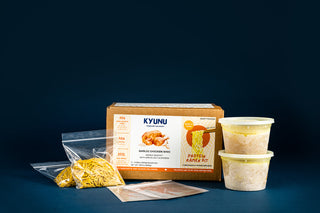If you’re on a keto diet, you’ve probably been told to count net carbs to stay in ketosis. But did you know that glycemic impact—how food actually affects your blood sugar—is just as important as the raw carb count?
Most traditional noodles are off-limits because they’re packed with digestible carbs that quickly spike blood sugar and kick you out of ketosis. But KYUNU noodles are different. Thanks to their high fiber, resistant starch, and protein content, they digest more slowly and have a lower glycemic impact, meaning they may not spike blood sugar the way traditional noodles do.
So instead of asking, "Do KYUNU noodles fit into keto based on net carbs alone?", the better question is:
"How do KYUNU noodles affect blood sugar and metabolic health?"
Let’s break it all down.
What Makes KYUNU Noodles Different?
Unlike traditional wheat or rice noodles, KYUNU is crafted with ingredients that reduce glycemic impact while increasing protein and fiber, including:
✔️ Vital wheat gluten & pea protein – Boosts protein for better satiety and muscle maintenance
✔️ Resistant starch & fiber – Supports gut health, slows digestion, and reduces glucose spikes
✔️ No added sugars or unnecessary fillers – Keeps carb impact lower than traditional noodles
This means that while KYUNU noodles do contain carbs, your body may not absorb them as quickly as it would with regular pasta, ramen, or rice noodles.
How Many Net Carbs Are in KYUNU Noodles?
Each serving of KYUNU noodles alone (not the kits) contains:
- Total Carbs: 38g
- Fiber: 10g
- Resistant Starch: 10g
So depending on how you calculate net carbs:
👉 Standard Net Carbs (Subtracting Fiber Only): 28g
👉 Adjusted Net Carbs (Subtracting Fiber & Resistant Starch): 18g
Since resistant starch doesn’t fully digest into glucose, the true net carb impact may be closer to 18g rather than 28g—though this varies by individual metabolism.
If you're following strict keto (<20g net carbs per day), KYUNU may be a better fit for a targeted or active keto approach. But if you're aiming for 20-50g net carbs per day, these noodles can be incorporated while staying within keto guidelines—especially when paired with fibrous vegetables that further slow digestion and reduce glucose impact.
Why Glycemic Impact Matters More Than Just Net Carbs
Net Carbs vs. Glycemic Impact
Most people on keto count net carbs (Total Carbs - Fiber) to stay under a daily limit, typically:
🥩 Strict Keto: <20g net carbs per day
🏋️ Active Keto: 20-50g net carbs per day
🧘 Low-Carb (Not Strict Keto): 50-100g net carbs per day
But net carbs don’t tell the whole story. A food with 10g of net carbs from sugar will spike blood sugar far more than 10g of net carbs from fiber-rich, slow-digesting foods.
This is where resistant starch and fiber—key components of KYUNU noodles—come in.
How KYUNU's Resistant Starch Affects Keto
KYUNU noodles contain resistant starch, a type of starch that resists digestion in the small intestine. Instead of breaking down into glucose quickly, resistant starch:
✅ Feeds beneficial gut bacteria – Which can improve metabolic flexibility
✅ Produces short-chain fatty acids (SCFAs) like butyrate – Which may help with ketosis
✅ Has a much lower glycemic impact than traditional starches
The result? Your body absorbs fewer carbs rapidly, meaning fewer blood sugar spikes and a better chance of staying in ketosis—even if the raw net carb count seems higher.
How to Reduce the Glycemic Impact of KYUNU Even More
If you want to further slow down carb absorption and support ketosis, adding certain fibrous vegetables to your meal can help.
🥇 Best Option: Oyster Mushrooms
- High in beta-glucans, a soluble fiber that slows carb absorption
- Only 0.9g net carbs per 1/2 cup cooked
- Adds an umami flavor that pairs perfectly with KYUNU
🥈 Runner-Up: Okra
- Contains mucilage, a gel-like fiber that further slows digestion
- 1.6g net carbs per 1/2 cup cooked
- Works well in broth-based noodle dishes
🥉 Spinach
- 1.3g net carbs per 1/2 cup cooked
- High in fiber, magnesium, and potassium, which support electrolyte balance on keto
- Adds volume and nutrients without significantly raising net carbs
🏅 Seaweed (Wakame)
- 0.5g net carbs per 1/2 cup rehydrated
- Rich in iodine and minerals, supporting thyroid health
- Naturally salty, enhancing flavor without added sodium
These vegetables won’t lower net carbs on paper—in fact, they slightly increase net carbs—but they can reduce how quickly the body absorbs carbohydrates, helping keep blood sugar levels more stable.
How to Actually Lower Net Carbs in KYUNU Meals
If you need to lower the overall net carb impact of the meal while keeping it flavorful and nutrient-dense, try:
1️⃣ Adding more leafy greens like spinach to increase fiber and reduce glucose spikes.
2️⃣ Incorporating fiber-rich, slow-digesting vegetables like oyster mushrooms, okra, or even bok choi.
3️⃣ Using seaweed (wakame) for extra minerals and umami flavor without adding significant carbs.
4️⃣ Using a glucose monitor (CGM or finger prick) to see how KYUNU affects your blood sugar—since resistant starch affects everyone differently.
Final Verdict: Are KYUNU Noodles Keto-Friendly?
KYUNU noodles are not a zero-carb noodle like shirataki, but thanks to their high protein, fiber, and resistant starch content, they can fit into a flexible keto or low-carb lifestyle—especially for those who exercise regularly. They are also easier on your gut than shirataki noodles, which have caused severe constipation in some consumers.
Instead of just looking at net carbs, focus on the glycemic impact. If you’re unsure how KYUNU affects your keto goals, track your blood sugar response with a glucose monitor. If your levels stay stable, you’ve found a keto-friendly noodle option that actually tastes good! 🎉
Ready to give it a try? Shop KYUNU now and experiment with your own keto-friendly toppings! 🚀









